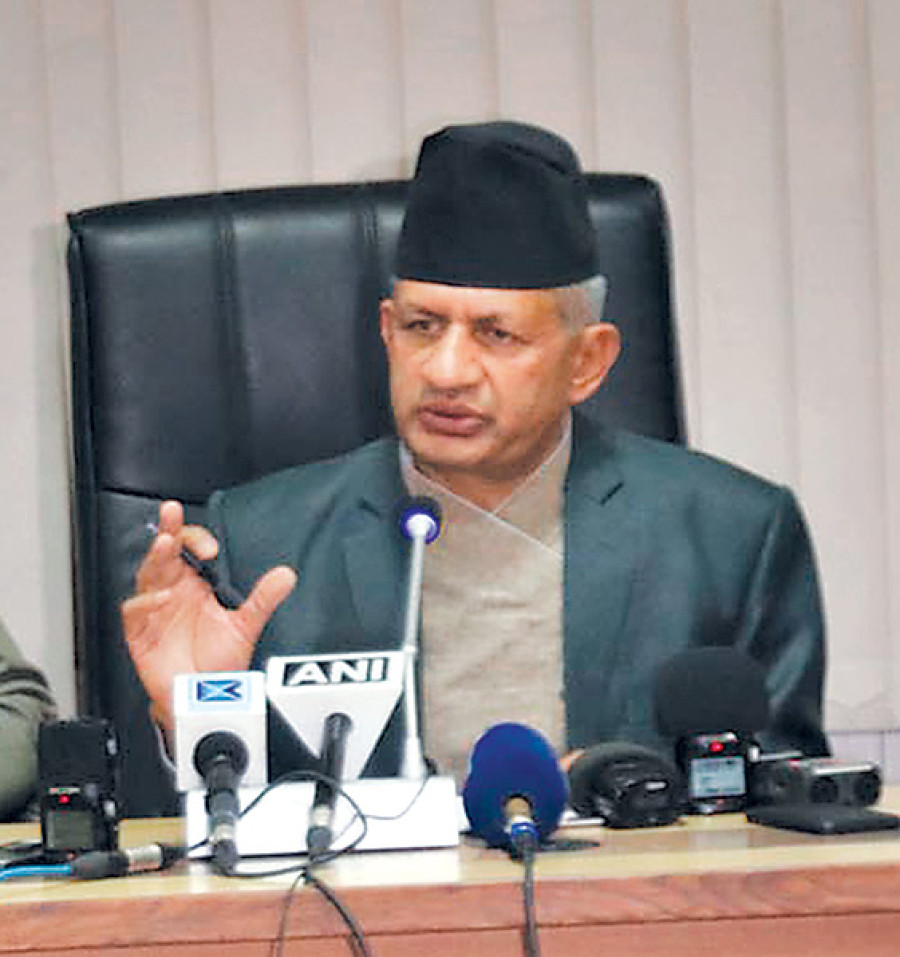Valley
Budhigandaki not on China visit agenda, says Gyawali
Foreign Minister Pradeep Gyawali has said that he is not going to discuss the 1,200 megawatt Budhigandaki hydroelectricity project with Chinese officials during his official visit to Beijing that begins on Tuesday.“We’re looking into the decisions taken by the erstwhile Sher Bahadur Deuba government, and have not taken any decision on what we should do with the project,” he told reporters at the Foreign Ministry hours before embarking on a six-day visit to China at the invitation of his counterpart, Wang Yi.The Chinese side has repeatedly expressed concern over the fate of the project, including recently by Chinese Ambassador to Nepal Yu Hong during her meeting with Energy Minister Barsha Man Pun.
Foreign Minister Pradeep Gyawali has said that he is not going to discuss the 1,200 megawatt Budhigandaki hydroelectricity project with Chinese officials during his official visit to Beijing that begins on Tuesday.
“We’re looking into the decisions taken by the erstwhile Sher Bahadur Deuba government, and have not taken any decision on what we should do with the project,” he told reporters at the Foreign Ministry hours before embarking on a six-day visit to China at the invitation of his counterpart, Wang Yi.
The Chinese side has repeatedly expressed concern over the fate of the project, including recently by Chinese Ambassador to Nepal Yu Hong during her meeting with Energy Minister Barsha Man Pun.
The then Pushpa Kamal Dahal-led government had awarded the contract to China’s Gezhouba Group Corporation to construct the project located in Dhading and Gorkha districts. Though it was enlisted as a component of the Belt and Road Initiative (BRI), the China-led plan that envisages greater trade and connectivity and supports construction of infrastructure projects, its fate now hangs in the balance.
The Deuba government had scrapped the agreement signed with the Chinese company showing defects in the bidding process and citing the directives of the parliamentary Agriculture and Water Resources Committee. The Deuba administration later said the project would be built with Nepal’s internal resources.
“Budhigandaki is not on my agenda,” said Gyawali, who is expected to meet Chinese Premier Li Keqiang and State Councillor and Foreign Minister Wang Yi, among other top officials, in Beijing.
According to officials, Gyawali notably will discuss projects under the BRI with Chinese officials, but they did not name which projects would be taken up in Beijing. “We’re discussing the modality of cooperation under the BRI in order to accelerate our economic development and bilateral cooperation. Once we complete discussion on the modality, we’ll take up other details with the Chinese side,” Gyawali said.
“First, we need to identity priority sectors under the BRI. Our priorities are energy, connectivity and border infrastructure,” the foreign minister added.
A finance secretary-led committee last year selected 20 possible projects but officials argue that the “preliminary” selection does not mean much when the final selections are made.
Minister Gyawali said his visit is aimed at communicating the priorities of the KP Sharma Oli-led government to the top Chinese leadership. “We have brought about a lot of changes and there have been huge political developments in Nepal. I will assure the Chinese leadership that the government in Nepal is committed to executing past accords reached with Beijing and, obviously, to strengthening bilateral ties.”
He said there was good progress in some China-aided projects while others needed to be discussed with the Chinese side to be taken forward, expressing the government’s commitment to implementing them. On Transit and Transportation Agreement signed during Oli’s first tenure as prime minister, Gyawali said that Nepal had already forwarded the draft in August 2017 to the Chinese side whose concurrence from was yet to be received from Beijing. Other key agreements signed by Oli included Nepal-China free trade agreement, petroleum exploration, cross-border infrastructure development and connectivity projects, opening up the Tatopani trading point and construction of the Outer Ring Road in Kathmandu. These projects including the transit deal were agreed in the backdrop of India’s border blockade of 2015-16.
Though he is expected to discuss PM Oli’s upcoming visit to China, Gyawali did not offer any specific dates. He said that Nepal will pursue “friendly and balanced relations with neighbouring countries,” and the ties would be multifaceted—concerning trade, investments, tourism and people-to-people contact.




 9.51°C Kathmandu
9.51°C Kathmandu













